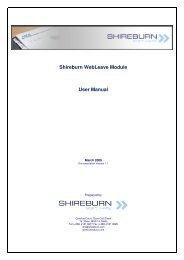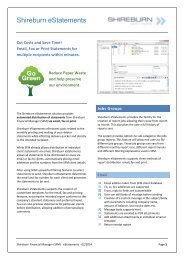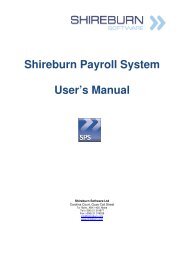MACP Newsletter 2.pdf - Shireburn Software Ltd
MACP Newsletter 2.pdf - Shireburn Software Ltd
MACP Newsletter 2.pdf - Shireburn Software Ltd
Create successful ePaper yourself
Turn your PDF publications into a flip-book with our unique Google optimized e-Paper software.
proach for instance, with its focus on issues such as<br />
loss, childhood experiences and transference, has<br />
been reported to have categorical constructive outcomes<br />
in the work with older individuals (Blando,<br />
2011). Cognitive Behaviour Therapy is also considered<br />
to be an effective and efficient approach<br />
with older adults (Blando, 2011). Its concentration<br />
on the present, the fact that it is highly structured,<br />
practical, goal-oriented, emphasizes skill enhancement<br />
and self-monitoring and is also psycho-educational,<br />
make CBT another favoured technique<br />
(Blando, 2011; Haight & Gibson, 2005; Myers, 1990).<br />
According to psychiatrist and geriatrician, Robert N.<br />
Butler (1975), Reminiscence Work is considered as<br />
a very generative and restorative approach when<br />
working with elderly clients. Although it can be<br />
organized individually, it is customarily conducted<br />
in groups and may operate effectively at different<br />
levels (Blando, 2011). It not only increases<br />
social interaction, but fosters a sense of accomplishment<br />
and self-worth; it encourages creativity,<br />
and amplifies feelings of belonging and togetherness,<br />
often also aiding in alleviating<br />
depression (Blando, 2011; Knight, 2004; Orbach,<br />
2003; The Benevolent Society, 2005).<br />
Similar but not quite the same, is the procedure of Life<br />
Review, also introduced by Robert N. Butler. This approach<br />
has a more structured slant and is frequently<br />
carried out individually (Blando, 2011). Founded on<br />
Erikson’s principles of human psychosocial development,<br />
the challenge in the particular life stage is<br />
Age is a question of mind over<br />
matter. If you don’t mind, it<br />
doesn’t matter.<br />
Leroy Paige<br />
to strive towards integrity, to put life in perspective<br />
and to assimilate past psychological themes into a<br />
new level of psycho social understanding and meaning,<br />
hence the term Life Review (Woodward, 1997).<br />
Striving to make sense of the life lived, encourages<br />
and supports reorganization, reconciliation and<br />
resolution (Butler, 1975; Woodward, 1997). The<br />
emphasis here therefore is on analytic and cognitive<br />
functioning and understanding (Blando, 2011).<br />
Resolving feelings about past failures or guilt about<br />
mistakes, grieving changes and losses encountered<br />
throughout life, remembering and celebrating successes<br />
and the many positive things that have happened<br />
during the years, are amongst the issues that<br />
are contended with during a Life Review session<br />
<strong>MACP</strong> <strong>Newsletter</strong> - July 2013<br />
(Blando, 2011; Kunz & Gray Soltys, 2007; Myers, 1990).<br />
Another analogous approach is that of Guided<br />
Autobiography, developed by James E. Birren, a<br />
gerontological theorist in the area of neuro-cognition<br />
and psychology. This approach encourages<br />
individuals to write their personal life story over<br />
a number of sessions and share it with others in<br />
the group (Birren & Cochran, 2001). This method<br />
not only facilitates a deeper and more profound<br />
understanding of the past but also supports the<br />
rich ness, intricacies and appreciation of how individual<br />
personal identity is fashioned by the<br />
“crosscurrents” in life (Birren & Cochran, 2001, p. 5).<br />
Contrary to what seems to have been a long-standing<br />
belief that counselling with older adults is futile, in<br />
effect is, or could be, a viable and promising prospect<br />
of service. As Blando (2011) so aptly claims, focusing<br />
on wellness, on strengths, on resilience and on the<br />
qualities that believe and allow people to grow and<br />
thrive, may not only result in the improvement of<br />
the overall functioning of the ageing individual, but<br />
may, in addition, be a positive and constructive development<br />
within the counselling profession itself.<br />
In view of the changing demographics and the remarkable<br />
increase in the projected global number<br />
of older persons (Lanzieri, 2011; Longman, 2010;<br />
Myers, 1990; Riedel-Heller, Busse & Angermeyer,<br />
2005), described by Maples (2006) as “The Silver<br />
Tsunami,” it may be timely, and of the essence, that<br />
this predicament be given heed, and that counselling<br />
services are made more available and accessible<br />
to elderly individuals who live in the community as<br />
well as to those who live within a residential setting.<br />
5








